Foundation Plugin
-
First look at a slab-on-grade (rectangular) foundation with multiple interior footings:
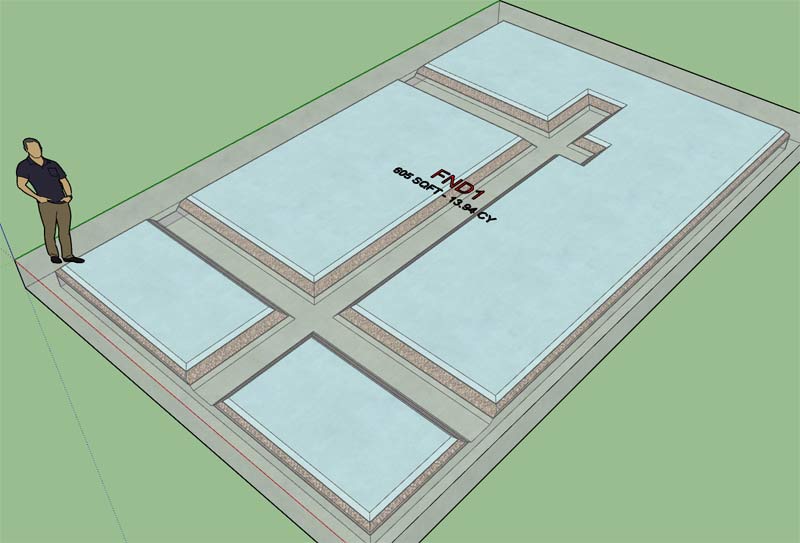
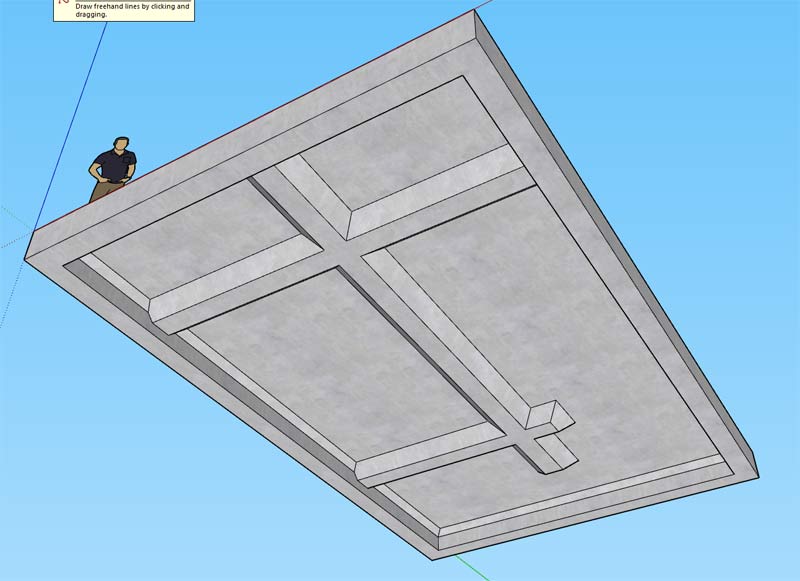
Note that this feature (interior footing module) allows for an unlimited amount of interior footings in any orientation and with each footing being customizable to its own specifications.
As shown in the image above this new feature also works with the subbase and slab insulation options.
Now I just need to work on the edit, move and delete functions for the interior footings.
-
This image demonstrates the vertical drop option/parameter along with various rebar configurations:
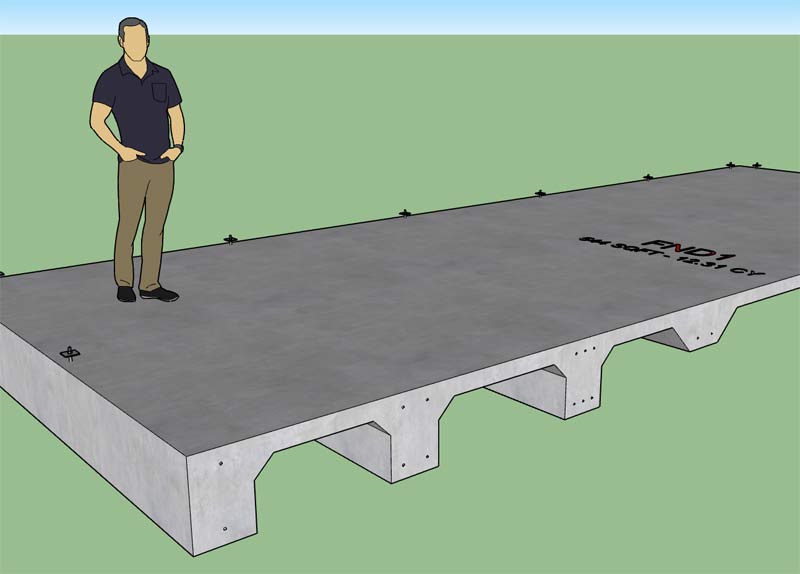
The footing to the far right is a typical 12" deep shallow footing with two bars.
The two central footings are 18" deep (4" slab) with a 10" vertical drop. When you specify a qty. of four or six bars the plugin will arrange the bars top and bottom as shown otherwise the bars will be positioned at the bottom of the footing (with a 3" ground clearance).
Note that all of the footings shown have a slope of 45 deg. however this can also be customized to any angle.
-
Working in 3D is a bit different, and poses some additional challenges, when compared with designing in a 2D environment.
Slab-on-Grade interior footings are an excellent example of this type of problem. In a 3D environment you are usually wanting to work on your model looking down at it rather than looking up at it. Unless you have modified the transparency of concrete material you are typically unable to view the interior footings you have created.
To remedy this problem I have created a hidden layer (normally hidden) that is toggled on when you go to add, edit, delete or move an interior footing. This layer not only contains the outline of each footing but also the label assigned to each by the plugin:
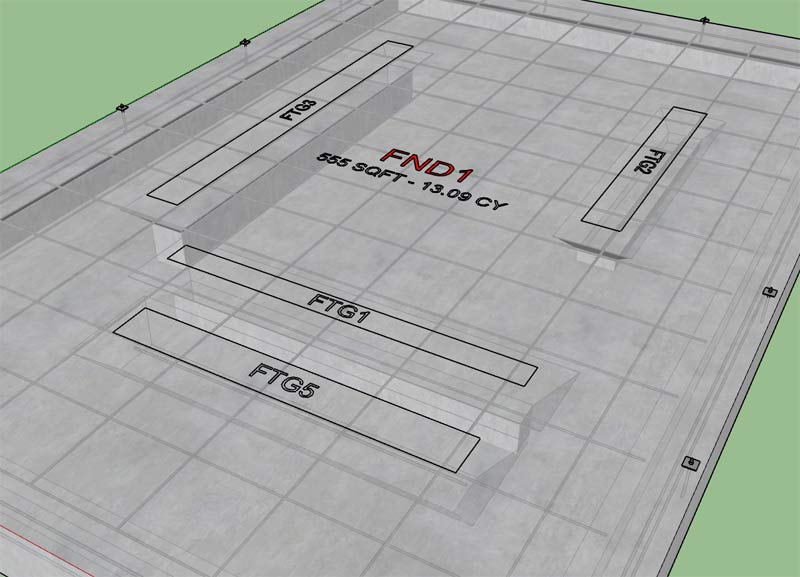
This layer can always be toggled manually by the user, but I have also setup the various tools to toggle it on and off during appropriate actions.
-
As I've been putting the new interior footing module through its paces it occurred to me that the waffle type floor systems seen in large parking structures and in Australian residential construction will now be possible with this new feature.
I'm pretty excited to finally see this feature become a reality. I should have made this happen a couple years ago, but in all truthfulness I probably did not possess the programming chops or experience to make it happen at the time.
Fast forward a couple years, and I have much better handle of what I can and can't do with SketchUp's API. I've also been able to lean on and gain advice from some of the SketchUp sages along the way. Thank-you for coming to my rescue, and being so generous with your advice and time, it has made all the difference.
-
Version 1.3.0 - 07.14.2019
- Added interior footings for rectangular slab-on-grade foundations.
- Added interior footings for polygon slab-on-grade foundations.
- Enabled editing, moving and deleting of interior footings for all slab-on-grade foundations.
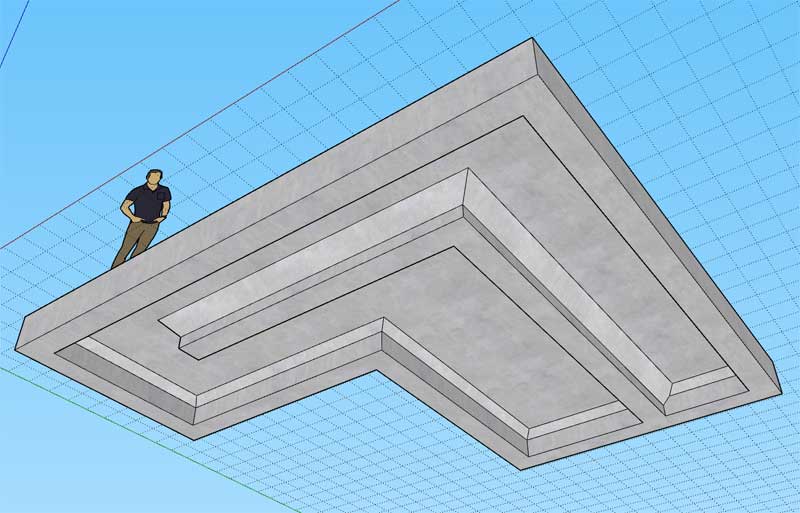
This is a substantial upgrade for slab-on-grade foundations. I've completely removed the old interior footing code and replaced it with the new interior footing module. The ability to add, move, edit and delete each interior footing on an unlimited basis is a breath of fresh air for this plugin.
Now I just need to do something similar for stemwall foundations and slabs... there is always more to do.
Later today, after a small break, I will put out a tutorial video explaining the features of this new module and demonstrate its use.
-
your download page for this indicates version 1.2.3 released 07/14/2019.
-
@juju said:
your download page for this indicates version 1.2.3 released 07/14/2019.
Which page are you referring to? Can you give me the URL. The plugin page on my website is showing version 1.3.0.
-
I've been considering the addition of a tool that adds in a depression to the slab-on-grade. The user would create any polygon shape which would then be used to generate this depressed region on the slab.
The actual modifications to the concrete slab would be fairly easy to accomplish with the API however a number of ripple effects would pose other problems. The first problem would be slab reinforcement. The depressed region would need to have its reinforcement translated down with the slab so it remains centered within the slab.
A similar problem exists for slab insulation and subbase material, these items would need to be moved down in the z direction as well. This of course is assuming that the slab in the depressed region remains the same thickness as the rest of the slab, however this might not be the case.
One could assign the a zero thickness to the depressed region slab thickness which essentially cuts a hole in the slab if the depression is equal to the slab thickness.
Or one could specify a thicker slab in this depressed region.
Regardless slab depressions are quite interesting and introduce a number of complex problems when combined with other features like internal footings, slab insulation, subbase and slab reinforcement.
-
After mauling this over a bit more I think I can deal with the concrete, slab insulation, interior footings and subbase fairly easily with a slab depression, however the slab reinforcement is a bit more challenging. Even the footing top bars are a bit problematic ( they need to be dropped as well) as one can see in the image below:
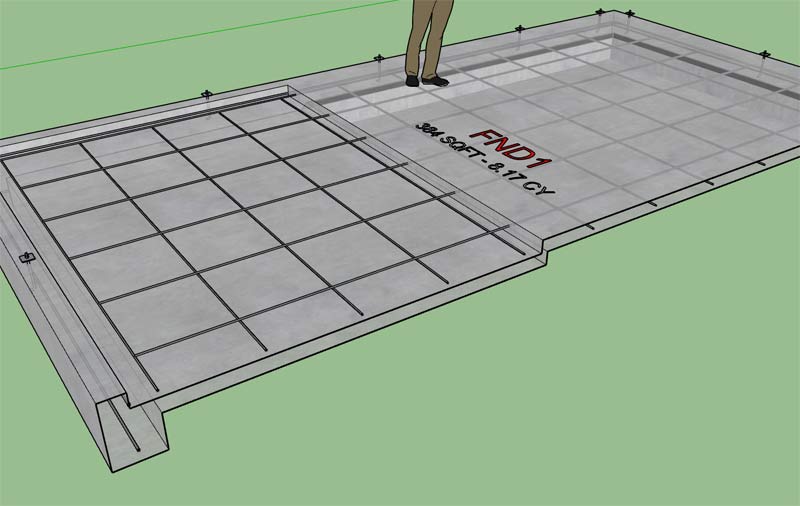
At the moment I don't have a good answer for how to deal with slab depressions when combined with slab reinforcement. If anyone has a good idea I'm open to suggestion.
This type of slab depression (4") is fairly typical for a garage that is attached to the main residence.
View model here:
3D Warehouse
3D Warehouse is a website of searchable, pre-made 3D models that works seamlessly with SketchUp.
(3dwarehouse.sketchup.com)
I'm not saying there are not solutions to this problem but they become very computationally expensive (ie. boolean subtraction) and are not at all optimal.
-
-
A website typo, please check it now...
Thank-you for promptly bringing this to my attention.
-
Tutorial 3 - Interior Footings for Slab-on-Grade Foundations (16:33 min.)
Interior footings for rectangular slab-on-grade foundations is identical to working with polygon shaped foundations.
-
First look at the slab depression toolbar:

This toolbar will allow the user to add, delete, edit or modify slab depressions within slab-on-grade or slab foundations.
-
BUG REPORT: I'm missing a transform in the "Add Interior Footing" tool, so if a foundation is created in a location other than the origin, it may produce an unexpected result (ie. shifted footing location). I am working on the fix currently. Funny that I never exposed this error in my testing or even in the tutorial video, it does take a special set of circumstances.
I've also identified another issue where two footings might be coincident at their ends (start or end) at a non-orthogonal angle, see image below:
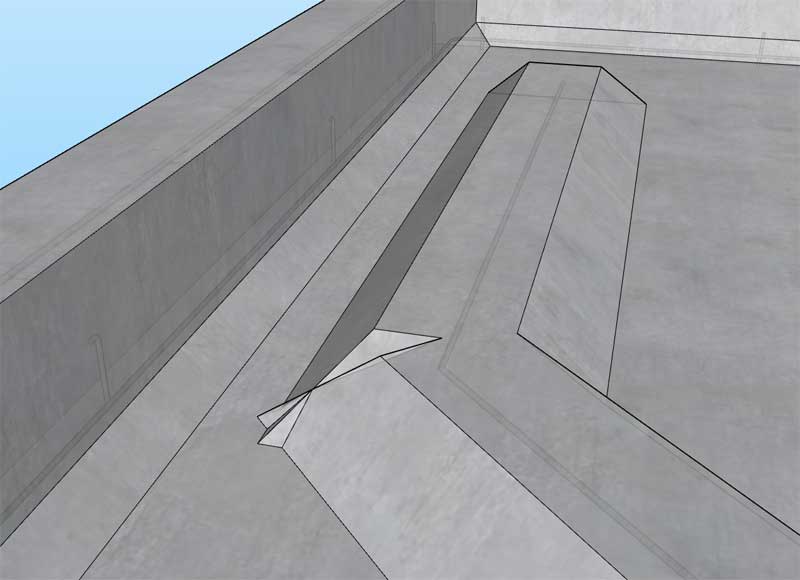
In such a situation rather than sloping the ends of the footing towards each other I need to miter the ends so that they meet cleanly. Just some additional code in the block of code that applies the slope to the footings.
If three footings or more footings were to meet at a single point then the boolean union of them would work out without a hitch, it is only when you join two footings at their ends that this scenario becomes an issue.
-
Version 1.3.0b - 07.16.2019
- Added the Slab Depression toolbar and icons.
- Enabled a 45 deg. miter option for the ends of interior footings.
- Fixed a bug with the initial positioning transforms for the interior footing draw tool.
The option for mitering is tucked into the start and end slope option. Now in addition to the Yes/No options you also can have it miter left or right (45 deg only).
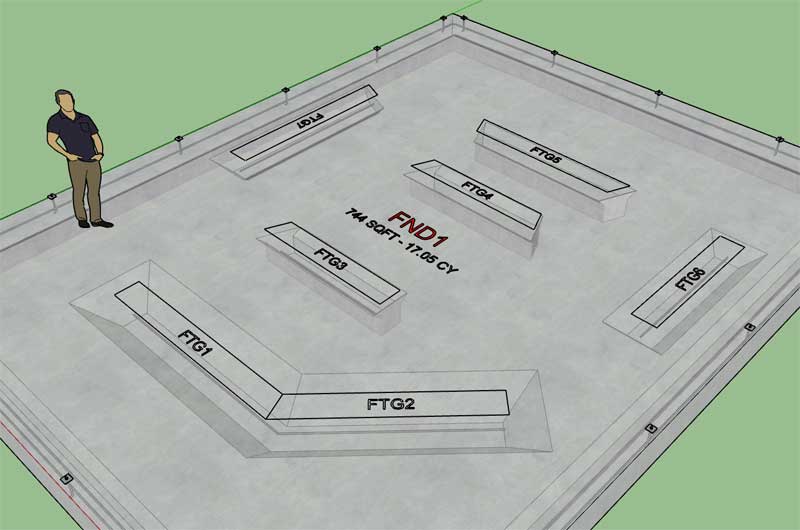
This is a critical update since the transform bug was a significant issue with Version 1.3.0.
The slab depression functions/tools are still under construction and currently not functional.
-
Hmmm, you might be on to something with this.
I agree that the amount of toolbars has multiplied quite rapidly as I keep adding more features to each plugin, it does take up quite a bit of screen real estate now.
-
thanks for the efforts!
the toolbars for your extensions are becoming rather elaborate and taking up a bit of toolbar / screen space, any chance you could implement a single initiation button/icon instead and have a secondary open when the primary has been triggered, much like Fredo does some of his extensions?
-
Version 1.3.1 - 07.19.2019
- Added slab depressions for rectangular and polygon slab-on-grade foundations.
- Enabled editing, moving and deleting of slab depressions for all slab-on-grade foundations.
- When construction callouts and subbase material is enabled, the volume of the subbase material is displayed beneath the foundation label (currently only slab-on-grade foundation assemblies have this feature available).
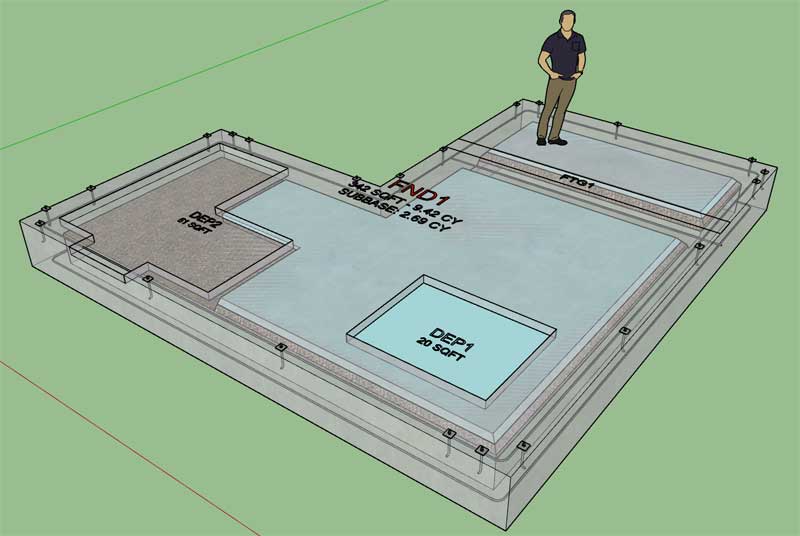
The slab depression tool can also be used to cut thru holes into the slab, as shown.
Note that additional work still needs to be done to properly modify rebar and mesh for slab depressions. Currently there is no logic in place to modify the perimeter or slab rebar when a slab depression is utilized within a slab-on-grade foundation.
View model here:
3D Warehouse
3D Warehouse is a website of searchable, pre-made 3D models that works seamlessly with SketchUp.
(3dwarehouse.sketchup.com)
-
Tutorial 4 - Slab Depressions for Slab-on-Grade Foundations (9:35 min.):
View model here:
3D Warehouse
3D Warehouse is a website of searchable, pre-made 3D models that works seamlessly with SketchUp.
(3dwarehouse.sketchup.com)
-
Trying to take a day off from the programming but my mind keeps coming back to it and the brick ledge module (for slab-on-grade foundations) I have left unfinished.
Giving it a bit of thought this afternoon and I've come up with the following parameters:
-
Ledge Width
-
Ledge Height
-
Start Ext.: Defaults to zero
-
End Ext.: Defaults to zero
Really not much to it, or so it would seem.
The idea is to be able to create a brick ledge on any specified edge (perimeter) of the foundation rather than around the entire foundation. A lot of modern designs only utilize a brick facade on the front of the house and not on the rear so this ability to be selective with each wall is critical.
Once I have this feature up and running I think the tools afforded the slab-on-grade type of foundation will allow it to be utilized for most designs however additional work will still need to be done to make the rebar placement correct in a complex design.
-
Advertisement










